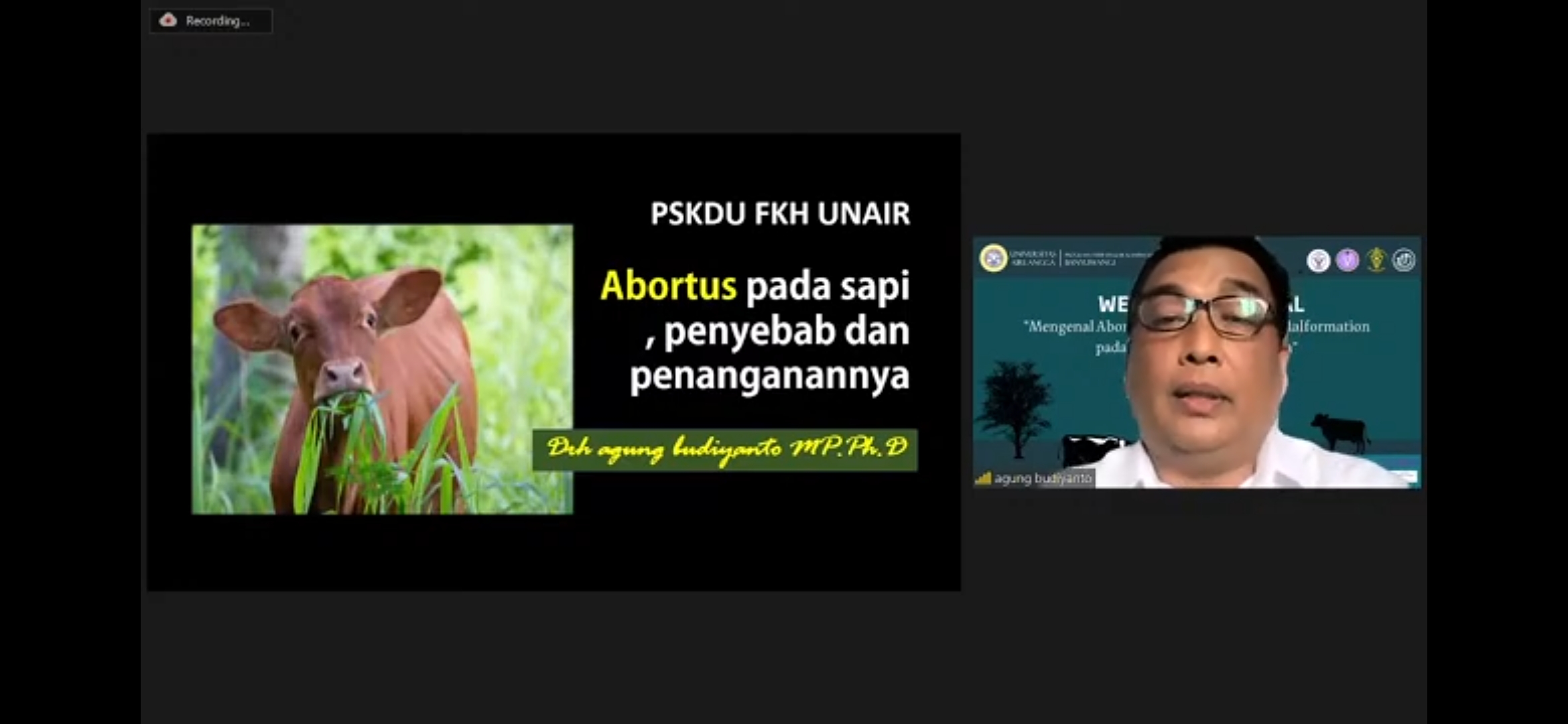UNAIR NEWS –
Abortus or generally known as miscarriage is a condition when a calf is unable to survive before being born but the growth of organs inside the fetus has already begun. There are loads of reasons why abortus can happen to a calf, and one of the main reasons is an infectious agent.
Due to lack of information and socialization to farmers and the general public about abortus, the Swine and Ruminant Care Division (SRC) of Veterinary Medicine Student Association PSDKU UNAIR in Banyuwangi, held a national webinar on “Identifying Abortus, Stillbirth and Fetal Malformation in Livestock and its Causes”.
This national webinar is also held in collaboration with the Indonesian Veterinarian Association (PDHI), East Java IV, Banyuwangi.
Drh. H Agung Budiyanto, MP., Ph. D as lecturer delivered a subject about the long and complex process of artificial insemination to the moment of birth. This process is one of the most crucial moments for farmers, where a little mistake may affect the process of cow pregnancy.
“Most of the time, abortus cases are often ignored by farmers and practitioners. They tend to let it happen naturally,” said drh. Agung Budiyanto on Saturday, June 12, 2021.
Furthermore, the expert commission of the Indonesian Ministry of Agriculture said that abortus is a waste, and there should be better management of cows and their calves.
Abortus on cows can be caused by an infectious agent and a non-infectious agent like genetics, nutrition, trauma, twin fetus, artificial insemination process, and other causes.
“While the infectious agent can come from viruses like Infectious Bovine Rhinotracheitis (IBR), Rhinotracheitis Infectiousa Bovis, Infectious Bovine Necrotic Rhinotracheitis, Necrotic Rhinitis, Red Nose Disease, and Bovine Coital Exanthema,” explained drh. Agung.
The Jembrana Virus on Balinese Variant of Cows, can be an example of an infectious agent. The main symptom of Jembrana Virus is miscarriage in cows. It is reported that 49% of pregnancy in cows that are infected by The Jembrana Virus, leads to miscarriage in all stages of pregnancy.
“The main infectious agent that causes abortus on cows often reported is Brucella abortus. This infectious agent causes cloron’s death, reproductive disorders that lead to temporal and or permanent infertility on calves, and placenta retention,” he said.
Drh. Agung Budiyanto then explained how abortus infection can be transmitted through an aborted abortus fetus, the placenta and placental fluid of an aborted fetus contain bacteria and viruses that lead to abortus. Those agents then may contaminate the environment and may infect the virus on any other livestock or even humans.
Infection can also be transmitted through the mucous membranes of the body, the digestive system, the respiratory system, and also the reproductive system. Cows that had experienced an abortus through a reproductive system infection may also be a carrier of the infectious agent and even the source of the infection.
So, what should we do when there is an abortus case? Drh. Agung Budiyanto explained that farmers must separate the abortus cows from the other cows in the vicinity. Farmers then have to extract the fetus in order to store and immediately collect some samples to be tested. Farmers must also clean all the residue of the abortus, disinfect the pen, and all the tools that are needed to sustain the cows. The healthy cows then needed to be given a proper amount of food and vitamins.
These days, the Indonesian Government has tried to prevent abortus cases with a regular vaccination program throughout Indonesia. Preventive action may also be done with disease surveillance and male seeds evaluation.
“Farmers education on livestock reproductive disease, feed, pregnancy nutrition, abortus cases recording, and investigation is our shared responsibility,” concluded drh. Agung Budiyanto.
Author : Muhammad Suryadiningrat
Editor: Nuri Hermawan (AC/AP)





